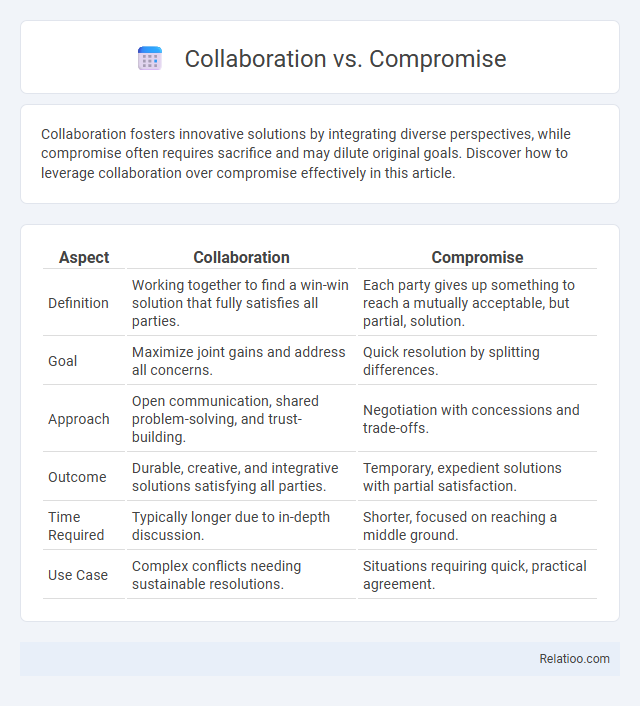Collaboration fosters innovative solutions by integrating diverse perspectives, while compromise often requires sacrifice and may dilute original goals. Discover how to leverage collaboration over compromise effectively in this article.
Table of Comparison
| Aspect | Collaboration | Compromise |
|---|---|---|
| Definition | Working together to find a win-win solution that fully satisfies all parties. | Each party gives up something to reach a mutually acceptable, but partial, solution. |
| Goal | Maximize joint gains and address all concerns. | Quick resolution by splitting differences. |
| Approach | Open communication, shared problem-solving, and trust-building. | Negotiation with concessions and trade-offs. |
| Outcome | Durable, creative, and integrative solutions satisfying all parties. | Temporary, expedient solutions with partial satisfaction. |
| Time Required | Typically longer due to in-depth discussion. | Shorter, focused on reaching a middle ground. |
| Use Case | Complex conflicts needing sustainable resolutions. | Situations requiring quick, practical agreement. |
Understanding Collaboration vs Compromise
Collaboration involves working together towards a shared goal with mutual input, fostering innovation and collective problem-solving, whereas compromise requires each party to make concessions, often leading to solutions that only partially satisfy all involved. Understanding collaboration vs compromise highlights that collaboration seeks win-win outcomes by integrating diverse perspectives without sacrificing core interests, while compromise balances competing needs by finding middle ground. Effective teamwork benefits from prioritizing collaboration to maintain commitment and creativity rather than settling for compromise that might dilute solutions.
Key Differences Between Collaboration and Compromise
Collaboration involves working jointly toward a common goal with shared responsibilities and mutual benefits, emphasizing open communication and trust. Compromise requires each party to make concessions, often resulting in a middle ground that may not fully satisfy either side. The key difference lies in collaboration fostering integrative solutions where all stakeholders gain value, whereas compromise typically produces distributive outcomes that balance conflicting interests.
Benefits of Collaboration in Problem-Solving
Collaboration in problem-solving harnesses diverse expertise and perspectives, leading to more innovative and effective solutions than compromise or simple cooperation. It fosters deep engagement and shared ownership of outcomes, which enhances commitment and accountability across team members. This integrated approach accelerates decision-making and drives sustained improvements in complex challenges.
Drawbacks of Relying on Compromise
Relying on compromise can lead to suboptimal outcomes where neither party fully achieves their goals, resulting in diminished satisfaction and motivation. Compromise often encourages settling for middle ground, which may neglect innovative solutions or long-term effectiveness compared to collaboration. Overuse of compromise risks perpetuating conflicts by masking underlying issues rather than addressing them through cooperative problem-solving.
When to Choose Collaboration Over Compromise
Choosing collaboration over compromise is crucial when Your goal is to achieve innovative solutions that fully satisfy all parties without sacrificing core values or objectives. Collaboration fosters a shared vision and leverages diverse expertise, leading to synergistic outcomes that compromise might dilute. Opt for collaboration in complex projects where mutual engagement drives long-term success and stakeholder alignment.
Communication Strategies for Effective Collaboration
Effective collaboration relies on open communication strategies that foster mutual understanding, active listening, and transparent information sharing among team members. Unlike compromise, which often involves negotiation and concessions, collaboration encourages collective problem-solving and shared decision-making to achieve common goals. Cooperation supports these efforts by promoting willingness to assist others and align actions, making communication critical for synchronizing efforts and ensuring all voices are heard.
Common Pitfalls in Compromising Situations
Compromising often leads to common pitfalls such as reduced project quality and unsatisfied stakeholders when parties settle for less-than-ideal solutions. Inadequate communication and unclear expectations can cause misunderstandings, resulting in imbalanced concessions that undermine long-term goals. Recognizing these challenges helps organizations decide when to pursue collaboration or cooperation for more sustainable and mutually beneficial outcomes.
Real-World Examples: Collaboration vs Compromise
Collaboration involves working together to achieve a shared goal, often resulting in innovative solutions, as seen in successful tech startups like Google, where diverse teams co-create cutting-edge products. Compromise requires each party to make concessions, such as in labor negotiations where unions and employers agree on middle-ground terms to avoid strikes. Your ability to distinguish these approaches can enhance teamwork effectiveness and drive better project outcomes.
Building a Collaborative Team Culture
Building a collaborative team culture involves fostering trust, open communication, and shared goals where collaboration integrates diverse perspectives for innovative solutions. Cooperation emphasizes working together effectively by sharing resources and responsibilities without sacrificing individual objectives, while compromise often requires concessions that may dilute the team's overall vision. Prioritizing collaboration over mere compromise or cooperation enhances synergy, drives collective success, and cultivates a resilient team environment.
Achieving Win-Win Solutions: Moving Beyond Compromise
Collaboration enables parties to jointly create innovative solutions that fully satisfy all stakeholders, surpassing the limited give-and-take nature of compromise. Cooperation involves working together toward common goals but may not address underlying interests as deeply as collaboration. Emphasizing collaboration over compromise fosters win-win outcomes by integrating diverse perspectives into value-creating agreements.

Infographic: Collaboration vs Compromise
 relatioo.com
relatioo.com